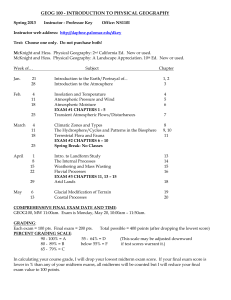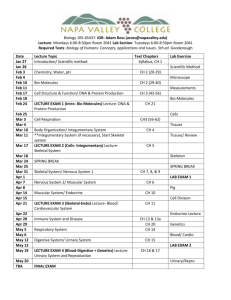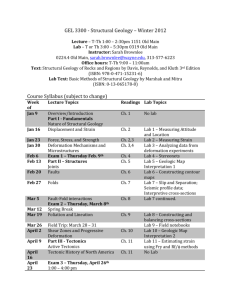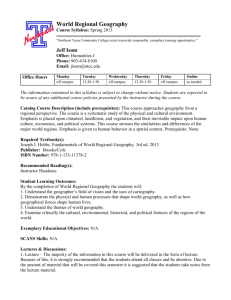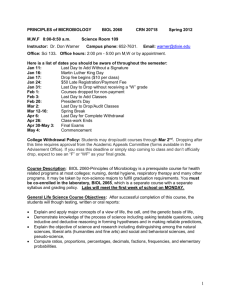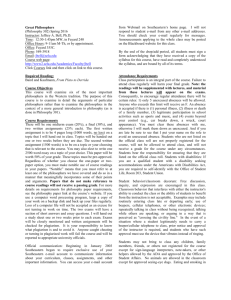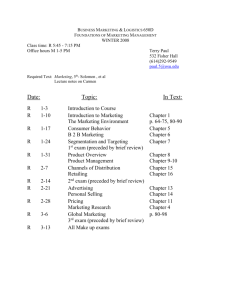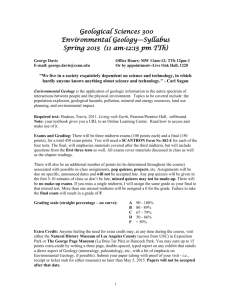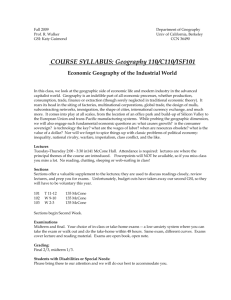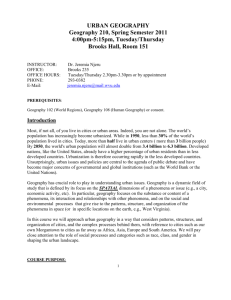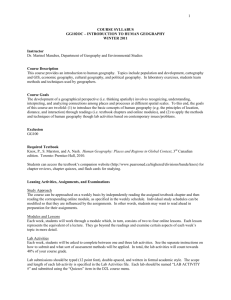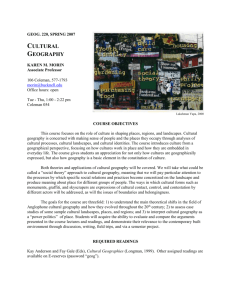View/Open - San Diego State University
advertisement
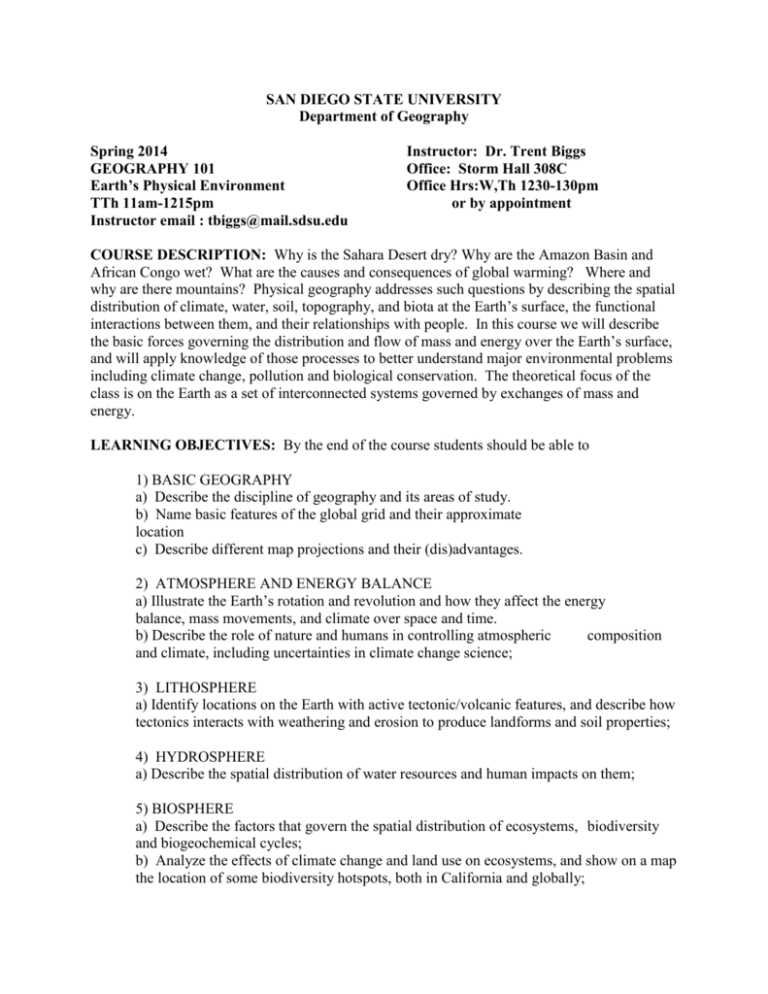
SAN DIEGO STATE UNIVERSITY Department of Geography Spring 2014 GEOGRAPHY 101 Earth’s Physical Environment TTh 11am-1215pm Instructor email : tbiggs@mail.sdsu.edu Instructor: Dr. Trent Biggs Office: Storm Hall 308C Office Hrs:W,Th 1230-130pm or by appointment COURSE DESCRIPTION: Why is the Sahara Desert dry? Why are the Amazon Basin and African Congo wet? What are the causes and consequences of global warming? Where and why are there mountains? Physical geography addresses such questions by describing the spatial distribution of climate, water, soil, topography, and biota at the Earth’s surface, the functional interactions between them, and their relationships with people. In this course we will describe the basic forces governing the distribution and flow of mass and energy over the Earth’s surface, and will apply knowledge of those processes to better understand major environmental problems including climate change, pollution and biological conservation. The theoretical focus of the class is on the Earth as a set of interconnected systems governed by exchanges of mass and energy. LEARNING OBJECTIVES: By the end of the course students should be able to 1) BASIC GEOGRAPHY a) Describe the discipline of geography and its areas of study. b) Name basic features of the global grid and their approximate location c) Describe different map projections and their (dis)advantages. 2) ATMOSPHERE AND ENERGY BALANCE a) Illustrate the Earth’s rotation and revolution and how they affect the energy balance, mass movements, and climate over space and time. b) Describe the role of nature and humans in controlling atmospheric composition and climate, including uncertainties in climate change science; 3) LITHOSPHERE a) Identify locations on the Earth with active tectonic/volcanic features, and describe how tectonics interacts with weathering and erosion to produce landforms and soil properties; 4) HYDROSPHERE a) Describe the spatial distribution of water resources and human impacts on them; 5) BIOSPHERE a) Describe the factors that govern the spatial distribution of ecosystems, biodiversity and biogeochemical cycles; b) Analyze the effects of climate change and land use on ecosystems, and show on a map the location of some biodiversity hotspots, both in California and globally; 6) SCIENTIFIC PROCESS a) Critically analyze differing viewpoints on controversial issues, with a focus on differentiating scientific statements and value judgments; b) Appreciate geography as both a quest for beauty and a method to analyze and address environmental problems. A major theme of the course is the role of questions in science and geography. All readings and homework will be oriented around asking and addressing questions, including an appreciation of what we know and do not know about the Earth. Another theme is the role of visualization and illustration in forming conceptual models of geographic phenomena. Students will be expected to draw diagrams of their conceptual understanding more than recall memorized facts. REQUIRED TEXT AND MATERIALS: 1. de Blij, Muller, Burt, Mason: Physical Geography, Oxford Univ. Press - Hardcopy available at SDSU Book Store 2. Additional readings will be posted on Blackboard. GRADING: Homework (4 assignments) Midterm # 1 Midterm # 2 Final exam 25% 25% 25% 25% EXAMS: The content of exams will be drawn from the homework, readings, and material covered in lecture. Exams will be graded on a curve if the highest score is less than 95%. All exams will require one (1) green scantron sheet (Form 882-E). - Missed exams may be made up for exceptional circumstances. The make-up exam may be different from and significantly harder than the original exam. If you miss an exam, you must contact the instructor within one week of the exam or you will receive a zero for that exam. - Re-grades on exams. Students may request that an exam be re-graded. This includes all questions and may either increase or decrease the score. LATE HOMEWORK: Homework will be docked 5% for each day late, including weekend days (e.g if it's due on Friday and turned in on Monday, that's 3x5% = 15% grade reduction). No late homework will be accepted more than one week after the due date; homework handed in more than one week after the due date will be given a zero. COURSE CONDUCT: - Cheating or plagiarism on homework or exams will result in a zero for that assignment or exam. Further disciplinary action may result. - Missed classes. Students must obtain notes from at least one other student if they miss a lecture. The instructor will not provide notes or review the lecture for students who missed a class. - Office hours. Visits during office hours are encouraged. Meetings outside of established office hours may be made by appointment. - Emailing the instructor is appropriate to set up office visits, and questions about course material may be emailed to the instructor. Answers to frequently-asked questions will be posted on BlackBoard. ** The instructor will not answer emails about homework assignments in the 24 hours before the homework is due, or about exams in the 24 hours before the exam. - Special needs such as learning disabilities or other disabilities will be handled individually. Confidentiality will be maintained in all cases. TENTATIVE SCHEDULE OF TOPICS WEEK DATES 1 2 Jan 23 Jan 28-30 3 Feb 4-6 4 Feb 11-13 5 Feb 18-20 6 Feb 25-27 7 8 9 10 Mar 4-6 Mar 11-13 Mar 18-20 Mar 25-27 11 Apr 8-10 TOPIC Introduction Physical geog, systems Maps and projections Earth-sun relationships Radiation Atmospheric composition Atmospheric temperature Atmospheric circulation Atmospheric moisture MIDTERM #1 Feb 27 Climate change Water resources Earth’s crust, plate tectonics Weathering and soil READINGS AND ASSIGMENTS Unit 1, 2, 3 Unit 4, 5, online articles HW#1 due Feb 11 Unit 6, 7, online articles Unit 8, 9 HW#2 due Feb 25 Unit 11, 12 Unit 18, 19 Unit 11, 38, online articles Unit 27, 30 Unit 36, 21 HW #3 due Mar 27 Unit 48, 49 Coastal processes and landforms MIDTERM #2 Apr 10 Apr 15-17 12 Biogeographic processes Unit 24, online articles Apr 22-24 13 Global carbon cycle Unit 24 cont’, 20, online articles Apr 29- May 1 Biodiversity and conservation 14 Unit 24 cont’, 26 online articles May 6-8 15 Human societies and physical HW # 4 due May 8 geography, Review FINAL EXAMINATION TUESDAY, MAY 13, 1030am-1230pm
